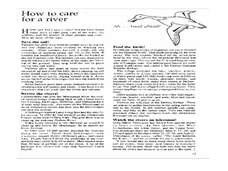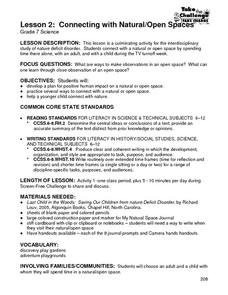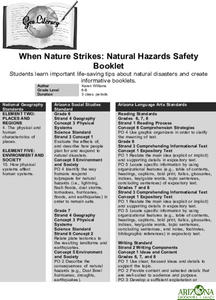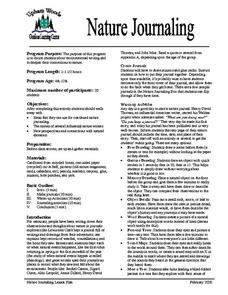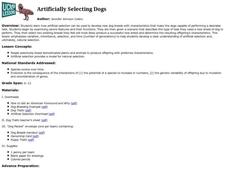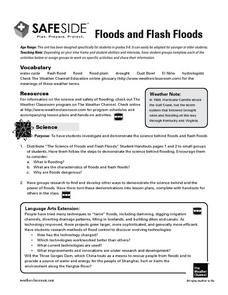Curated OER
Natural Resources Product Booklet
Students conduct a research activity and create a base product booklet that helps them recognize the resources that are available to them from the natural resources in the area that they live in.
Curated OER
The Delicate Balance - Iowa's Natural Resources
Discover the natural resources in Iowa by studying it's history. In this environmental lesson, your students will observe a topographical map of Iowa and identify where its most valuable resources are. They complete an Iowa name...
Curated OER
What is an Ecological Footprint?
Introduce youngsters to the term ecological footprint. Learners identify ways in which humans affect the environment. They look at the problems associated with the use of natural resources, and focus on ways to preserve natural...
Take the challenge
Connecting with Natural/Open Spaces
Get your class outside, away from the television, and maybe even learning something about nature while they're at it. Individuals will chose an open, natural space to spend time in for several days. Each day they will complete a page in...
Purdue University
Let’s Go Outside
Nature is good for the soul. The final activity in the fine-part Family Nature Program series discusses the benefits of having an active connection with nature. Learners complete an imagery activity that relates nature to a calming...
ARKive
Natural Selection- the Peppered Moth
Can human activity cause animals to evolve? Your budding biologists will find out the answer to some of the big questions in natural selection with a peppered moth activity. They will watch a few short videos, look at pictures, and...
Chicago Botanic Garden
Greenhouse Gas Emissions — Natural and Human Causes
What impact do humans have on greenhouse gas emissions? What are the natural causes of these gasses? Thanks to the carbon cycle, carbon dioxide eats away at the earth's atmosphere with the intensified help of humans. Young scientists...
Curated OER
When Nature Strikes: Natural Hazards Safety
Students observe the impact of natural disasters on humans, and become aware of the dangers of environmental hazards such as flash floods, tornadoes, and hurricanes.
Curated OER
Science: Schoolyard Trees
Sixth graders choose specific trees to research while taking a nature walk around the schoolyard. They discuss tree and leaf parts and observe various types of leaves. After writing their reports, 6th graders present them to the class...
Curated OER
Leaves: All-Natural Solar Collectors
Take a good look at tree leaves and notice the adaptations for collecting solar energy. Pupils trace the margins of five different leaves onto graph paper and count the number of squares covered. They then relate this infomation to the...
American Forest Foundation
Who Speaks for the Trees?
Help young conservationists appreciate the important role that trees play in ecosystems around the world with this collection of six engaging activities. From a shared reading and class discussion of Dr. Seuss' The Lorax, to in an depth...
Curated OER
Nature Journaling
Writers participate in a unique form of environmental writing and deepen their connections to nature through journaling. They generate new ideas and thoughts that they can use for continued nature journaling and explore a variety of...
National Wildlife Federation
Yesterday: Our Energy Needs Over Time
How has our relationship to energy changed over time? An engaging exploration challenges learners to create a timeline showing human energy needs and uses over time. Scholars review what timelines are, choose a 50-year period in history...
Royal Society of Chemistry
Separating Mixtures: How We Concentrate Natural Materials
Have your class look at a granite specimen and describe what they see. They should note three distinct components. Discuss mixtures with them and how they might be separated, then send them to the lab to figure out how to take apart five...
California Academy of Science
Composting: A Scientific Investigation: California Academy of Sciences
Garbage, recycle, compost: Does it really matter where we put our trash once we are done? By making detailed observations over seven weeks, kids will see which materials break down naturally to become a healthy part of the soil, and...
Curated OER
Natural Disaster
Describe how plate tectonics account for various land formations. Learners discuss different marine sanctuaries and create a poster about tectonic activity in these areas. They share their posters with the class.
Curated OER
Settlement Exploration: Then and Now
NASA has crafted an imaginative and memorable series of lessons, "NASA and Jamestown Education Module." This lesson is one of the five components. In it, middle schoolers connect history and science by comparing the settlement of...
University of California
Artificially Selecting Dogs
Selective breeding has resulted in some novel and beautiful or useful dogs over the years. Using the American Foxhound as an example, genetics learners find out how and why they came about. Then, in small groups, they select breeds to...
STEM for Teachers
Tsunami!
How does the depth of an ocean affect the speed of a tsunami's waves? Use Jell-o, graham crackers, and marshmallows to model the effects of an underwater earthquake and its resulting tsunami. The lesson includes hands-on activities,...
Curated OER
Floods and Flash Floods
Junior geologists, hydrologists, or meteorologists simulate what happens during the flooding of a river and demonstrate factors that contribute to flash flooding. This outstanding resource provides a vocabulary list, online resources,...
Curated OER
Does Global Warming Increase the Intensity of Atmospheric Natural Disasters?
Students study global warming by communicating the problem, process and solutions. In this global lesson plan students use graphs, research and write a critical stance on natural disasters.
Curated OER
Living With Risk: The Human Element of Natural Disasters
Students explore human elements that are a part of natural disasters, read a Hawaiian myth, conduct a survey, discuss why people choose to live in high risk areas, and participate in a writing activity based on studenT real life accounts...
Curated OER
It's a Gas - Natural Gas
Students use plastic bottles, water, and condiment packets to simulate how natural gas comes from decaying ocean plants and animals. In this natural gas lesson plan, students also fill out lab packets and answer exit questions.
Curated OER
Myths and Legends on Natural Disasters: Making Sense of Our World
Learners explore different natural and manmade disasters through a webquest. In this earth science instructional activity, students explain their causes. They also discuss how disasters affect society.
Other popular searches
- Science Natural Disasters
- Science Natural Phenomena
- Science Natural Resources
- Science Natural Events
- Science Natural Cycles
- Natural Science Grade 9
- 4th Grade Natural Science
- Natural Science Powerpoint
- Natural Science Grade 3
- Science Materials Natural



